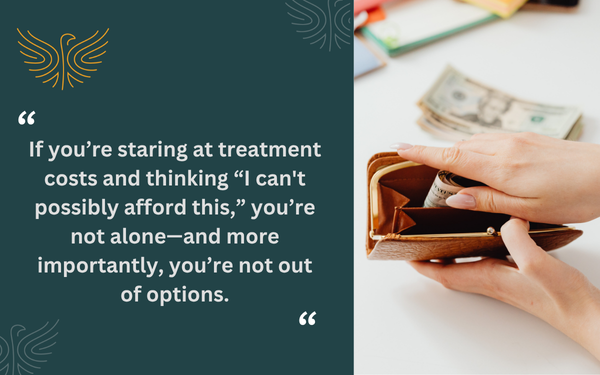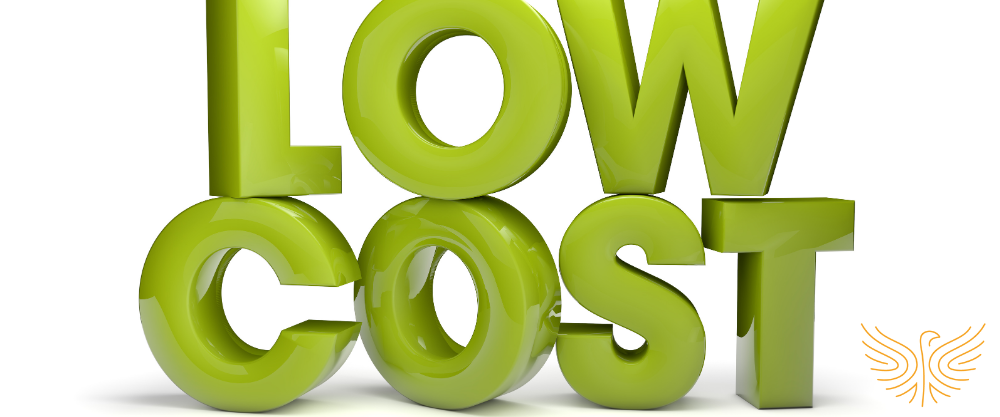The cost of addiction treatment can feel like an insurmountable wall between you and recovery. Looking at rehab prices might leave you feeling hopeless and wondering if healing is only for those who can afford it.
If you’re staring at treatment costs and thinking “I can't possibly afford this,” you’re not alone—and more importantly, you’re not out of options. Free and affordable treatment programs exist across the country, created specifically to ensure everyone has access to recovery, regardless of their financial situation.

Below, we help you navigate the landscape of low-cost and free treatment options, showing you how to find, qualify for, and access these life-saving programs. Recovery is possible regardless of your income, insurance status, or current circumstances!
_______________________________________________________
Treatment Options
Addiction is a medical condition, not a moral failing or luxury problem—and treating it is healthcare, not an indulgence. Just as someone with diabetes deserves insulin regardless of their bank account, you deserve addiction treatment regardless of your financial situation.
Across the country, government agencies, nonprofits, and dedicated professionals work tirelessly to ensure that money doesn’t stand between people and recovery. So, what options should you potentially explore?
Government-Funded and State-Supported Rehab Programs
Federal and state governments fund numerous treatment programs specifically designed for people who can’t afford private rehab.
For example, the Substance Abuse and Mental Health Services Administration (SAMHSA) serves as your gateway to these resources. Their treatment locator at SAMHSA.gov allows you to search for nearby facilities that offer subsidized or free treatment. You can filter results by payment assistance or specifically look for programs that accept patients regardless of ability to pay. Many state health departments fund local outpatient and residential programs with sliding-scale fees or completely free beds reserved for residents who qualify.
Medicaid, available in most states, also often provides comprehensive coverage for addiction treatment, including detox, residential care, outpatient therapy, and medications. If you’re uninsured and low-income, applying for Medicaid could open doors to treatment you thought were closed.
Nonprofit and Faith-Based Organizations
Countless nonprofit and faith-based organizations provide free or donation-based treatment services, driven by missions of service rather than profit. These organizations often offer comprehensive programs that rival expensive private facilities in their dedication to recovery.
The Salvation Army Adult Rehabilitation Centers is one example that operates across the United States, providing free residential treatment programs that typically last six months. While they incorporate work therapy and spiritual components, they welcome people of all faiths, including those with none.
Catholic Charities, despite its name, also serves everyone regardless of religious affiliation, offering counseling, case management, and sometimes residential programs at little to no cost.
Additionally, local churches, synagogues, mosques, and community centers frequently host recovery programs or can connect you with affordable resources. Community recovery centers—peer-run organizations focused on long-term recovery support— further frequently provide free counseling, recovery coaching, and sober social activities.
Ultimately, researching options in your specific area can help you narrow down what works for you. And don’t hesitate to reach out to the leaders of these programs or organizations; sometimes, we all need a helping hand.
Sliding-Scale and Income-Based Treatment Centers
Sliding-scale pricing means treatment costs adjust based on your income level—you pay what you can afford. Many private and nonprofit treatment centers offer this flexible pricing structure because they believe recovery should be accessible to everyone.
Finding these centers requires some research, but resources exist to help. Also, don’t hesitate to call treatment centers directly, even if they seem expensive initially. Many facilities reserve a certain number of beds for scholarship recipients or offer payment plans that make treatment manageable. When you call, be honest about your financial situation—most admissions counselors genuinely want to help you find a way to access treatment. They might offer reduced rates, extended payment plans, or refer you to other affordable options in your area.
Free Community-Based and Peer Support Options
While not formal treatment programs, free support groups provide important components of recovery: community, accountability, and hope. These groups have helped millions achieve and maintain sobriety without any cost barrier.
Alcoholics Anonymous (AA) and Narcotics Anonymous (NA) offer meetings in virtually every community, often multiple times daily. These 12-step programs provide structure, sponsorship, and a proven pathway to recovery. For those seeking alternatives, SMART Recovery further offers a science-based, non-religious approach using cognitive-behavioral techniques.
On top of the above, online meetings have become widely available, eliminating geographic and transportation barriers. You can attend meetings from your phone or computer 24/7, finding support whenever you need it.
While peer support alone might not address all aspects of addiction, especially for those needing medical detox or mental health treatment, these groups provide invaluable ongoing support that complements and reinforces formal treatment.
University-Affiliated Clinics and Research Programs
Universities with medical or psychology programs often provide free or low-cost treatment through research studies or training clinics. These programs offer evidence-based care supervised by licensed professionals, often including cutting-edge treatments not yet widely available.
For example, clinical trials for new addiction treatments frequently provide free care to participants, sometimes including medications, therapy, and follow-up support. While you’re contributing to research, you’re also receiving high-quality treatment at no cost.
At the end of the day, financial limitations should never be the reason standing between you and the help you need. Curious to learn more about taking that next step? The Freedom Recovery Centers (FRC) team is here to help. Call us today at 804-635-3746 for more information.
.svg)






.svg)

.svg)



.svg)
